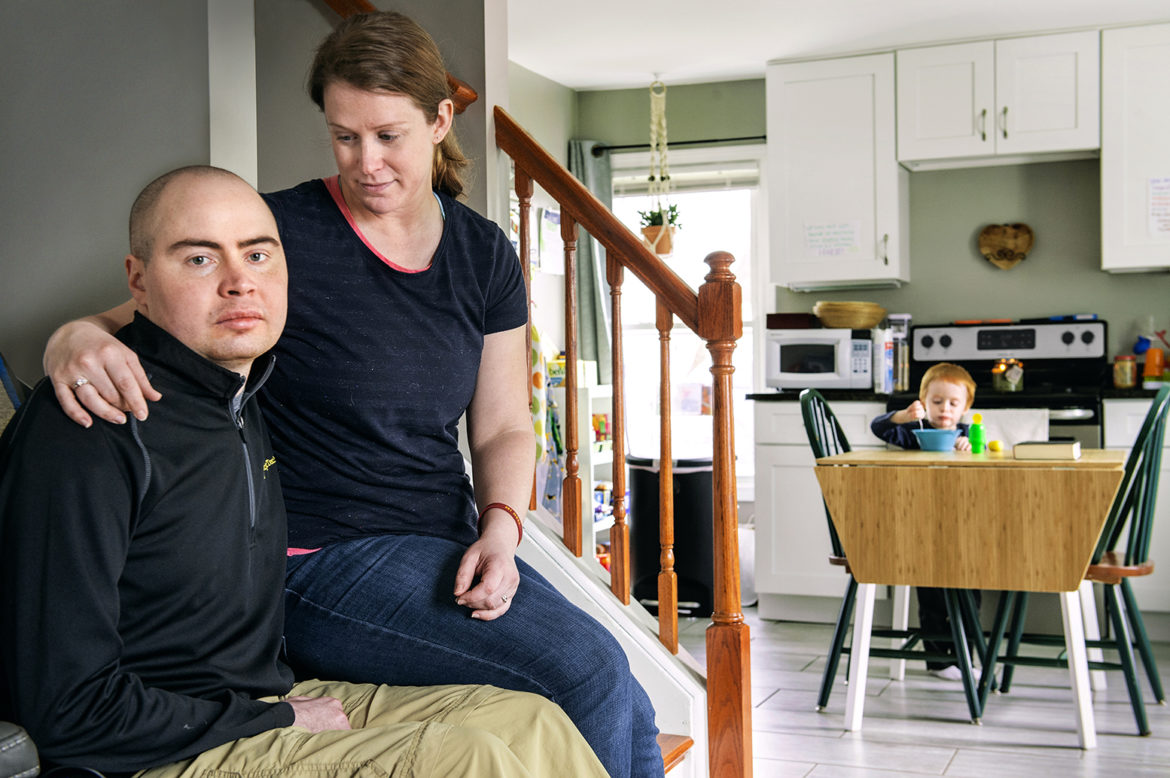By Peggy McCarthy
Recommend Tweet Email Print More
By Peggy McCarthy
Recommend Tweet Email Print More
For the last six years, Idervan DaCosta has endured shortness of breath and pain in his lungs that feels like they are on fire. This happens every couple of months and lasts a few weeks at a time. DaCosta attributes it to inhaling toxins while sleeping yards away from burn pits in Afghanistan. But the U.S. Department of Veterans Affairs (VA) denied his application for disability benefits for the condition.
Now, the Marine veteran and Brookfield resident has more hope.
The Senate passed and the House is poised to give final approval to a bill that gives some 3.5 million post-9/11 veterans and those of other eras an easier path to compensation and care for illnesses that occur after exposure to burn pits and other environmental toxins. President Biden has promised to sign the bill.
The massive measure, known as the PACT Act, will cost more than $300 billion over the next decade, according to Congressional Budget Office estimates. It adds 23 illnesses, including certain cancers and respiratory and lung diseases, for the VA to presume are connected to toxin exposure in the military. As a result, veterans with these issues will no longer have to prove a service connection to these illnesses.
Veterans spend months to years applying for compensation for burn pit-related illnesses after serving in Iraq, Afghanistan and the Persian Gulf, but most are denied. In 2020, the VA reported to Congress that just 20% of more than 12,000 applications were approved between 2007 and 2020.
The act also adds VA staff and 31 new offices in the country and will strengthen research and provide a framework for handling future presumptive illnesses. For veterans of the Vietnam War, which ended 47 years ago, it adds Thailand, Guam and five other places as presumed locations for Agent Orange (AO) exposures and includes hypertension as a service-connected illness from AO, which was long sought by Vietnam War veterans. The bill also provides benefits to families exposed to toxic water at the Camp LeJeune Marine Base and veterans exposed to carcinogens in Uzbekistan and radiation at a 1966 B-52 crash in Palomares, Spain.
The bill will “begin to right the nation’s shameful inaction by helping veterans affected by toxic exposure.”
— U.S. Senator Richard Blumenthal, D-Conn., member of the Senate Veterans Affairs Committee
DaCosta, 33, said the 16 Marines on his small base threw lithium batteries, human feces, plastics, food and other debris into a burn pit and doused it with diesel fuel. “You were not able to stand next to it for more than 30 seconds, or you’d pass out,” he recalled. He spent seven months at the 40-square-yard site where the burn pit sat in the middle of a courtyard, blazing 24 hours a day.
He explained that everything that wasn’t used was disposed of to prevent the Taliban from making bombs from ordinary objects like pens and soda bottles. “We were not thinking of the consequences of what we were doing and how it was going to impact our lives 10 or 20 years down the line,” he said.
DaCosta began having breathing and lung problems three years after returning from Afghanistan, one of three deployments. He is treated at the VA with asthma medication and is now appealing his denial. Asthma is one of the illnesses named in the bill. He also has a back injury from falling off a roof when he was a machine gunner and Post Traumatic Stress Disorder (PTSD) and receives disability compensation for those conditions. He has a chemistry degree and will receive a master’s in finance and investment management this summer.
Too Late For Some Veterans
The legislation is too late for veterans who have died from illnesses related to toxic exposures.
Veterans “are dying every day waiting for people to make a decision. We should not nickel and dime them ‘til they die.”
— Linda Schwartz, a former VA assistant secretary for policy and planning, former state commissioner of Veterans Affairs.
Craig Rosen of Windsor died at 31 of glioblastoma brain cancer, which typically affects older people, but has been increasingly seen in post-9/11 veterans exposed to burn pits. It is included in the bill as a presumptive condition. An Army veteran who served in Iraq, he was denied disability compensation by the VA. He appealed, but died before his case was decided.
The cancer caused headaches, vision problems, incoherent speech and lack of mobility, forcing him to use a wheelchair, said his father, Allan Rosen, who lived with him.
Because he didn’t have dependents, his case was closed upon his death, said Cindy Johnson, his lawyer and deputy director of the Connecticut Veterans Legal Center. Johnson is pursuing more than the $300 in death benefits his family received and will argue the connection to his burn-pits exposure. “It helps the family when [the VA] acknowledges that what he was dying of was due to his service,” she said.
Johnson criticized the legislation for excluding veterans with other than honorable discharges. “Yes, they’re exposed to the carcinogens. Yes, they will likely die from service-connected conditions. But they cannot get compensation,” she said.
Amy Antioho of Berlin would have had more time with her husband, Peter, before he died if she hadn’t spent a year applying for disability benefits in connection with his glioblastoma. The VA rejected his application twice before ultimately granting him benefits.

Melanie Stengel Photo.
In this 2019 photo, Amy Antioho is pictured with her husband, Peter, an army veteran, exposed to black smoke from a burn pit in Afghanistan who died of glioblastoma. Mark, their son, is in the background.
“I do feel like I lost a lot of time with Peter because I was constantly on the phone,” she said. “I was constantly doing research. I think it would have been beautiful to have spent that time with him rather than fighting for something I believe he had already earned.” She did so much work on his behalf that the Senate Veterans Affairs Committee asked for her records when drafting the legislation.
Antioho gets angry when she hears objections to the bill’s cost. “I really think the cost that’s too high is my son growing up without a father. My husband was 34—that’s the cost that was too high,” she said. Her son, Mark, is 6 and has just completed kindergarten. Her husband, an Army veteran and West Point graduate, had to walk through heavy smoke from burn pits twice a day in his job as second in command on his Afghanistan base.
Antioho expressed concern that many veterans won’t pursue benefits. She said her husband considered it begging and didn’t want to apply. “I look at my husband as having died for our country,” she said.
Thomas J. Saadi, state Veterans Affairs commissioner, encouraged veterans to apply even if they were unsuccessful in the past. “Don’t take a denial of 10 or 20 years ago to mean that you’re going to be denied today,” he said. “No veteran should feel they are not worthy of a benefit they are eligible for,” he added.
He urged veterans to call his office at 860-616-3684 for help in filing claims. Veterans’ organizations, such as Veterans of Foreign Wars (VFW), also offer assistance.
Support Our Work
The Conn. Health I-Team is dedicated to producing original, responsible, in-depth journalism on key issues of health and safety that affect our readers, and helping them make informed health care choices. As a nonprofit, we rely on donations to help fund our work. Donate Now


